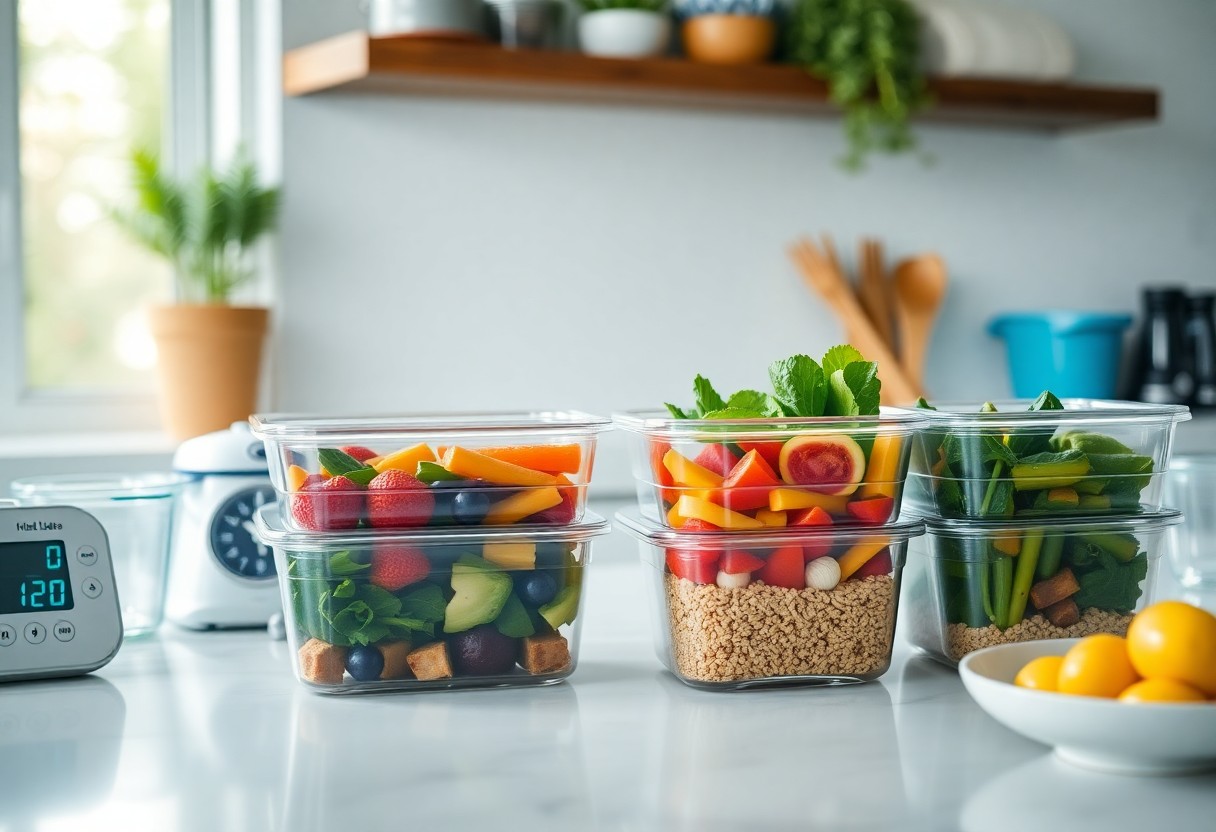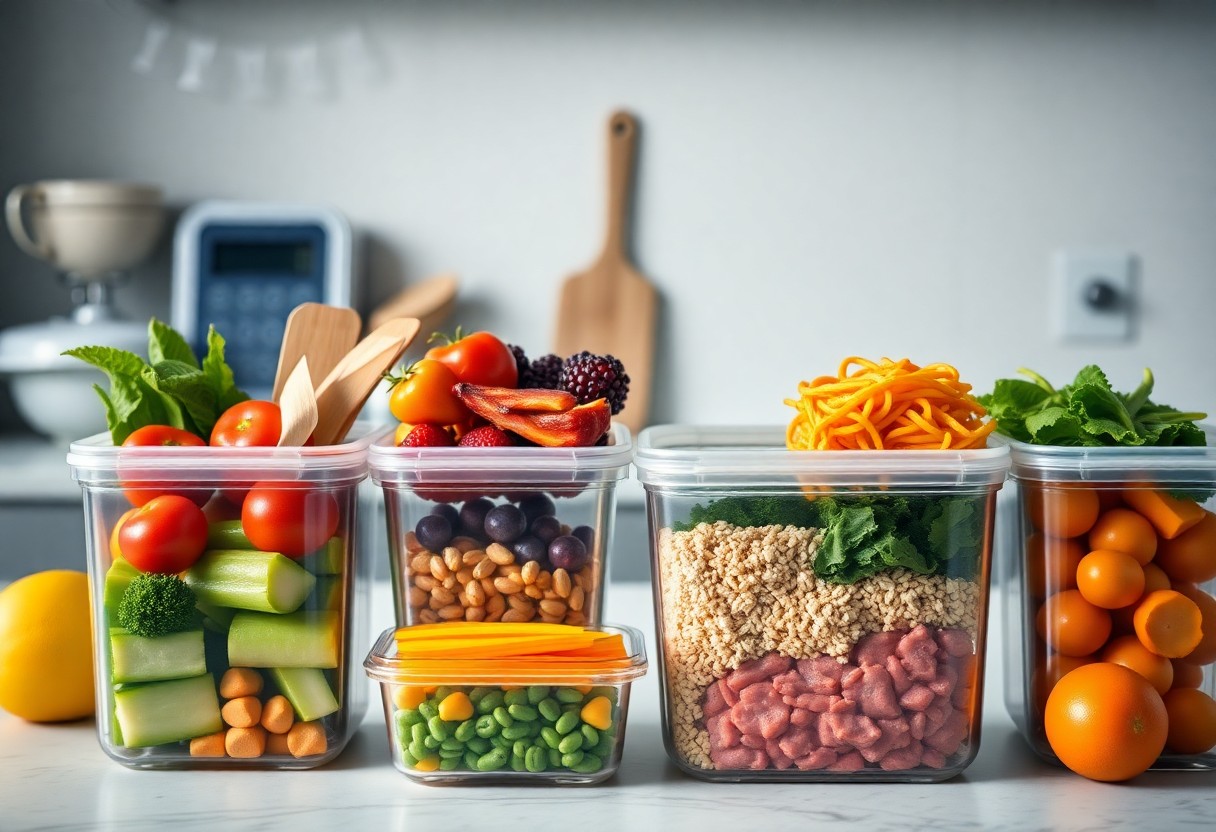You can significantly enhance your productivity and support your fitness ambitions by prepping your meals for the week. By dedicating a few hours to plan and prepare nutritious meals, you not only cut down on cooking time during busy weekdays but also ensure you have healthy options readily available. This practice helps you avoid impulsive food choices and makes it easier to stick to your dietary goals. Let’s explore effective meal prep strategies and tips that will streamline your week and elevate your overall wellness.

Benefits of Meal Prepping
While meal prepping may seem like a chore, the benefits it brings extend far beyond convenience. By dedicating time to prepare your meals in advance, you can optimize your nutrition, save money, and stay committed to your fitness goals. Embracing meal prep can transform the way you approach food, making healthy eating easier and more enjoyable in your busy lifestyle.
Time Management
The act of preparing your meals for the week allows you to take control of your schedule. Instead of scrambling to cook each day, you’ll find that meal prepping frees up time in your day for workouts, relaxation, or other important tasks. By having your meals ready, you reduce stress and eliminate indecision about what to eat, leading to more productive days.
Nutritional Control
Below, you will find that meal prepping offers you a significant level of nutritional control over your eating habits. By deciding in advance what to include in your meals, you can ensure a balanced diet tailored to your fitness goals.
Prepping your meals gives you the opportunity to choose fresh ingredients and control portion sizes. This proactive approach allows you to avoid unhealthy options and serves as a powerful tool in reaching your fitness objectives. You can explore various recipes, incorporate more fruits and vegetables, and minimize processed foods, leading to improved energy levels and overall well-being.
Planning Your Meals
Any successful meal preparation starts with a thoughtful plan. Take the time to sit down and assess your weekly schedule, dietary needs, and fitness goals. Think about how many meals you need to prepare, which meals are necessary, and what works best with your lifestyle. A clear outline will not only streamline the cooking process but also help you stay committed to your nutrition plan throughout the week.
Selecting Recipes
Planning your recipes is necessary for keeping your meal prep exciting and aligned with your fitness objectives. Choose a variety of dishes that incorporate a balance of proteins, carbohydrates, and healthy fats. Think about flavors you enjoy and explore new recipes that fit your dietary preferences. This will help you remain consistent and motivated throughout the week.
Creating a Shopping List
Among the key steps in meal planning is creating a shopping list that aligns with your selected recipes. This organized approach ensures that you have all the necessary ingredients on hand and allows you to avoid unnecessary impulse purchases.
But a well-crafted shopping list goes beyond just ingredients; it also helps you stay focused and saves time while grocery shopping. Categorize your list by food groups or sections within the store to make your trip more efficient. This way, you can quickly grab what you need without wandering through aisles. By preparing a thorough shopping list, you set yourself up for successful meal prep and a healthier week ahead.
Cooking Techniques for Meal Prep
Your meal prep success hinges on mastering a few effective cooking techniques. By employing strategies such as batch cooking and utilizing kitchen tools, you can streamline the process of preparing meals, allowing you to save time while sticking to your fitness goals. Enhancing your skills in these methods can lead to more nutritious options and less stress throughout the week.
Batch Cooking
Beside saving time, batch cooking allows you to prepare large amounts of food at once, maximizing efficiency. You can cook multiple servings of your favorite dishes and store them in portioned containers, ensuring you have healthy meals ready to go, minimizing the temptation to opt for less nutritious options when hunger strikes.
Utilizing Kitchen Tools
Along with cooking techniques, the right kitchen tools can significantly enhance your meal prep experience. Investing in items like food processors, slow cookers, and quality storage containers can make a world of difference in both efficiency and ease.
To optimize your meal prep, use kitchen tools that save time and effort. A food processor can chop vegetables quickly, while a slow cooker allows you to set it and forget it, creating delicious meals without constant supervision. Keeping your meal prep streamlined will leave you with more time to focus on your fitness routine and achieving your goals.
Storage and Organization
Keep your meal prep streamlined by implementing effective storage and organization strategies. Use clear, labeled containers to easily identify your meals at a glance. Group similar items together in your fridge and pantry to maintain order and make your dietary choices more accessible. This way, you'll save time searching for ingredients and enjoy a more efficient cooking process.
Choosing Storage Containers
Between glass and plastic, select storage containers that are BPA-free and microwave-safe. Glass containers are excellent for reheating and maintain the freshness of your meals, while plastic options are lightweight and often more portable. Choose various sizes to accommodate different meal portions, creating a versatile storage system for your prepped ingredients.
Optimizing Refrigerator Space
Any space in your refrigerator can be maximized with thoughtful organization. Utilize stackable containers and drawer dividers to separate different food categories. Frequent use of clear, airtight containers will prevent spoilage and keep your meals fresh. By placing the most perishable items at the front, you’ll encourage yourself to use them first, reducing waste and keeping your meal prep on track.
Further, consider implementing a rotating system where older meals are placed at the front and newer meals at the back. This ensures you consume your prepped meals before they spoil. Use vertical space by stacking containers and placing smaller items on the top shelf. Lastly, maintain an inventory list on your fridge door, so you always know what meals you have prepared and ready to go, making it easier to stick to your meal plan.

Staying Motivated
Unlike relying on willpower alone, having a structured meal prep plan can keep you on track with your fitness goals. By incorporating Time-Saving Meal Prep Ideas To Fuel Your Active Lifestyle, you can streamline your meals and reduce the temptation to stray from your healthy eating habits. Consistently preparing your meals not only saves time but also reinforces your commitment to a healthier you.
Setting Goals
The key to staying motivated is setting achievable, realistic goals that align with your fitness journey. Break your goals into smaller milestones that you can celebrate along the way, whether it’s preparing a balanced meal plan for the week or achieving a specific fitness target. Writing down your goals and tracking your progress will keep you encouraged and focused on your ultimate objectives.
Keeping Variety in Your Meals
At the heart of maintaining motivation in meal prep is the importance of variety in your meals. To avoid the monotony of eating the same things day in and day out, diversify your ingredients and explore new recipes. This not only keeps your taste buds excited but also ensures that you receive a well-rounded array of nutrients. Integrating different proteins, grains, and seasonal vegetables into your meal prep will make healthy eating more enjoyable and sustainable.
Goals should not limit your culinary experiences; they can inspire creativity in the kitchen. Playing with flavors and textures can allow you to discover delightful combinations that keep meals exciting. Use meal prep as an opportunity to try out new herbs, spices, and cuisines. By rotating meals weekly and experimenting with different recipes, you ensure that your journey toward fitness is both enjoyable and fulfilling.
Common Meal Prep Mistakes
After stepping into the world of meal prep, you may still encounter some pitfalls that hinder your progress. It's vital to be aware of common meal prep mistakes to streamline your efforts effectively. For insightful strategies, check out How to Successfully Meal Prep for the Week: Time-saving Tips ....
Overcomplicating the Process
Prep your meals with simplicity in mind. When you add too many ingredients or techniques, meal prep can quickly become overwhelming. Focus on straightforward recipes using easily accessible ingredients to make the process enjoyable, rather than a chore.
Ignoring Portion Sizes
Sizes matter when meal prepping, as they directly impact your fitness progress. Proper portion control helps you stay aligned with your nutritional goals, whether that's weight loss, maintenance, or muscle gain.
But if you overlook portion sizes, you risk either overeating or undereating, which can derail your progress. Use measuring cups or a food scale for accuracy to ensure you stay on track with your dietary needs and goals. Being mindful of portion sizes will not only help you reach your fitness objectives but will also contribute to a more balanced lifestyle.
Conclusion
To wrap up, prepping your meals for the week not only streamlines your cooking process but also helps you stay aligned with your fitness goals. By dedicating a little time to plan and prepare ahead, you can ensure that nutritious options are readily available, reducing the temptation to opt for unhealthy choices. This proactive approach allows you to focus more on your workouts and overall wellness, making it easier to achieve the results you desire.
FAQ
Q: What are the benefits of meal prepping for my fitness goals?
A: Meal prepping offers multiple advantages, including time savings during the week, better portion control, and the ability to make healthier choices. By dedicating a few hours to prepare your meals in advance, you'll avoid the temptation of convenience foods and can ensure that your meals align with your nutritional targets. This structured approach can lead to more consistent progress toward your fitness goals.
Q: How do I start meal prepping effectively?
A: To begin meal prepping, first decide on a day that suits you best, typically over the weekend. Choose a selection of recipes that fit your dietary preferences and requirements. Make a shopping list and purchase all necessary ingredients. When prepping, focus on cooking items in bulk, such as grains, proteins, and vegetables. Store them in portioned containers for quick access throughout the week. Keep it simple to maintain consistency.
Q: How can I keep my meal prep interesting and varied?
A: Variety is key to staying motivated with meal prepping. Experiment with different cuisines, use a range of herbs and spices, and rotate your protein sources such as chicken, fish, legumes, and nuts. Incorporate seasonal vegetables and try new recipes regularly to keep meals fresh and exciting. Additionally, consider using different cooking methods, like grilling, roasting, or steaming, to add diversity to your meals.
Q: What’s the best way to store my prepped meals to maintain freshness?
A: To keep your prepped meals fresh, utilize airtight containers made of glass or BPA-free plastic. Ensure your meals are cooled down before sealing them to prevent condensation. Label your containers with dates to track freshness. Most meal preps can be stored in the refrigerator for up to four days or can be frozen to extend their shelf life. Reheat thoroughly before consuming to ensure food safety.
Q: Can meal prepping help me manage my budget?
A: Yes, meal prepping can lead to significant savings on your grocery bill. By planning your meals in advance, you can buy ingredients in bulk, reduce food waste, and avoid last-minute takeout expenses. Additionally, when you prepare your meals at home, you have greater control over your ingredients, which can often be more cost-effective compared to pre-packaged or restaurant meals. By budgeting and tracking your spending on groceries, meal prepping can become a financially savvy decision.

0 Comments